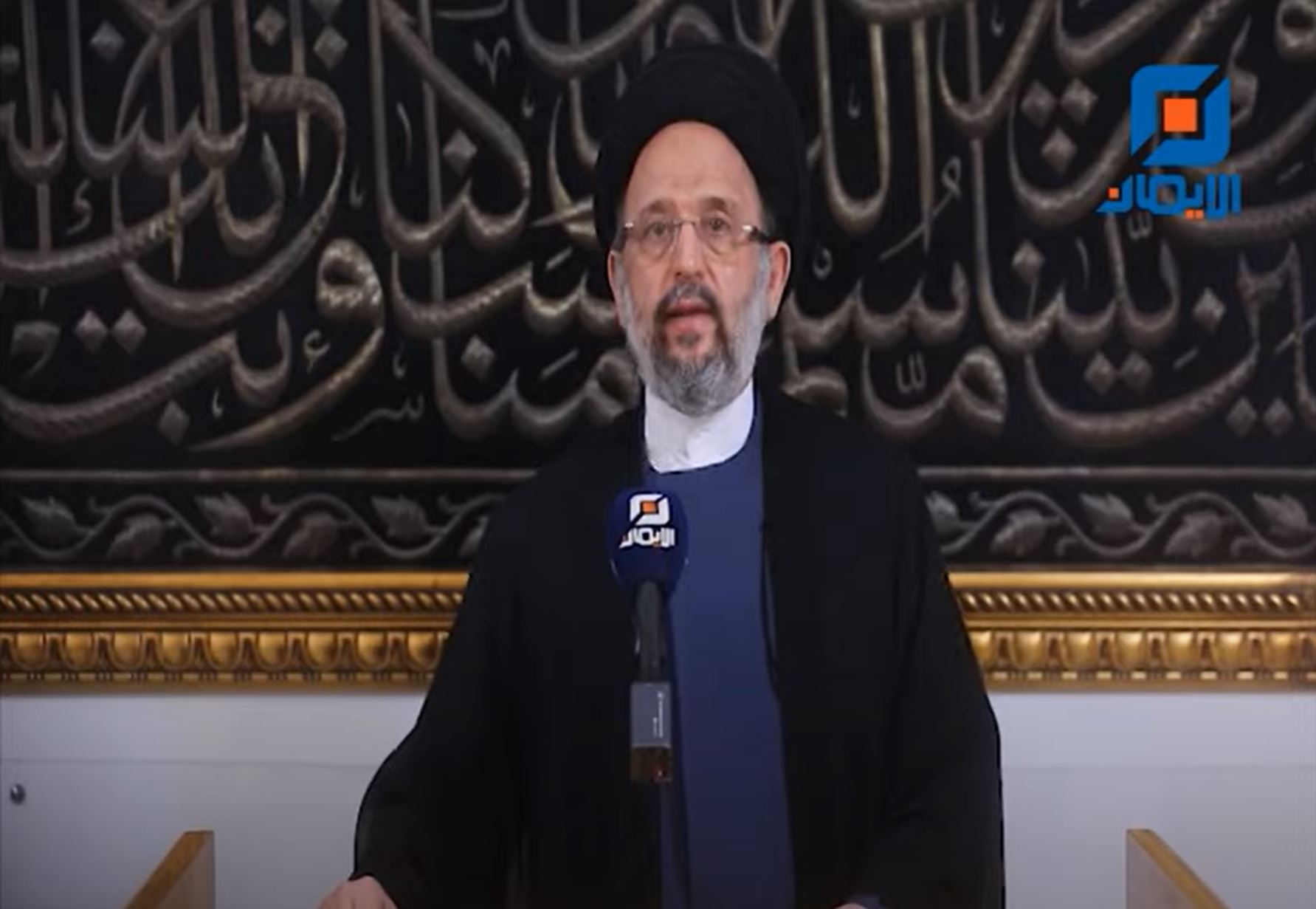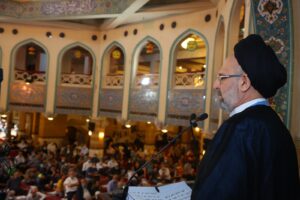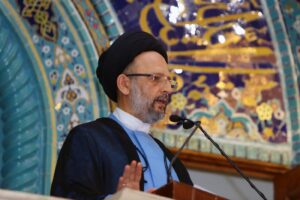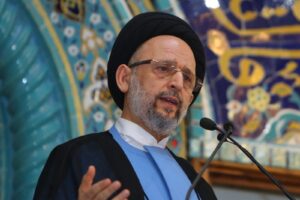The role of supplication in facing calamities
In The Name of Allah, The Compassionate, The Merciful.
His Eminence, Sayyed Ali Fadlullah, delivered in the context of the Friday Talk, a religious speech on Rajab 25,1441 H. /March 20, 2020.. Following is an edited text of his talk:
Allah, the Most Exalted says in His Glorious Book: And hasten to forgiveness from your Lord and a garden as wide as the heavens and earth, prepared for the righteous.
Allah, The Most Exalted, Speaks the Truth.
One of the graces, Allah has bestowed on His servants, is opening the door for forgiveness and returning to Him when they become oblivious or when they become weak before the desires of this world or when the whims , interests and fanaticisms overwhelm them , or when they disobey Allah and neglect what He has ordered or prevented them from doing. Instead, He could have closed this door and hold them accountable for what they had done.
Furthermore, He had facilitated the means of forgiveness for them, for He did not consider the magnitude of their sins a barrier that hinders forgiveness. He also did not limit it to any time and place, nor did He stipulate any form that the believer should abide by. It is enough for the sinful to address God to find Him merciful and forgiving. This is what He had promised and He never breaks a promise: And whoever does a wrong or wrongs himself but then seeks forgiveness of Allah will find Allah Forgiving and Merciful. And :And ask forgiveness of your Lord and then repent to Him. Indeed, my Lord is Merciful and Affectionate. And : Then exalt [Him] with praise of your Lord and ask forgiveness of Him. Indeed, He is ever Accepting of repentance.
He also said to those who exceed the limits and commit too many sins: O My servants who have transgressed against themselves [by sinning], do not despair of the mercy of Allah. Indeed, Allah forgives all sins. Indeed, it is He who is the Forgiving, the Merciful. He also said in a Sacred Hadith(Hadith Qudsi): O son of Adam, were your sins to reach the clouds of the sky and were you then to ask forgiveness of Me, I would forgive you. O son of Adam, were you to come to Me with sins nearly as great as the earth and were you then to face Me, ascribing no partner to Me, I would bring you forgiveness nearly as great as it. The Messenger said that Allah advised you to ask for forgiveness , because He wishes to forgive you.
Not only did Allah make forgiveness a means for being purified from sins and restoring the relations with Him, but He also encouraged us to do so, considering forgiveness one of the best worshipping deeds and one of the best ways of mentioning Allah and being purified from sins. The Messenger says: “By Allah, I seek forgiveness from Allah and I repent to him more than seventy times in a day.”
Asking for forgiveness is also a means to bring about Allah’s gracious gifts. He says:
And said, ‘Ask forgiveness of your Lord. Indeed, He is ever a Perpetual Forgiver.He will send [rain from] the sky upon you in [continuing] showers. And help you with wealth and sons, and make for you gardens, and make for you rivers. TheMessenger says : “If anyone constantly seeks pardon (from Allah), Allah will appoint for him a way out of every distress and a relief from every anxiety, and will provide sustenance for him from where he expects not.”
Asking for forgiveness, dear loved ones, is not only sought for when one does not perform the mandatory worshipping deeds or when one commits sins. It also extends to when one does not shoulder his duties to those he is responsible of such as those of the parents towards their children and spouses or those of the neighbors towards one another, or towards fellow believers. Besides, it extends to the duties of the employee towards his employers or the ruler towards the ruled. Imam Zein Al-Abidien says in some of his Duas:
O God, I ask pardon from You for
َthe person wronged in my presence whom I did not help,
the favor conferred upon me for which I returned no thanks ,the evildoer who asked pardon from me and whom I did not pardon, the needy person who asked from me and whom I preferred not over myself
As to how to ask for forgiveness it goes far deeper than the tongue, as Imam Ali explained, when asked about ‘istighfar’: Do you know what ‘istighfar'(asking Allah’s forgiveness) is? ‘Astighfar’ is meant for people of a high position. It is a word that stands on six meanings.
1. To repent over the past.
2. To make a firm determination never to revert to it.
3. To discharge all the rights of the people so that you may meet Allah quite clean with nothing to account for.
4. To fulfil every obligatory which you ignored (in the past) so that you may now do justice with it.
5. To aim at the flesh grown as a result of unlawful earning, so that you may melt it by grief (of repentance) till the skin touches the bone and a new flesh grows between them.
6. To make the body taste the pain of obedience as you (previously) made it taste the sweetness of disobedience. On such occasion you may say: ‘astaghfirullah’. Thus , dear loved ones, let us hasten to restore our relations with God through this worshipping act , so as to make it void of any fault , Once our relation with Allah is good , our relation with ourselves and with others would also be good. We should do this right now and not postpone it for tomorrow or the day after. Allah, the Most Merciful, will accept our repentance and forgive us, for His door is open, and He loves the pious who repent and ask for His forgiveness. He is Forgiving and Merciful.
.
His Eminence, Sayyed Ali Fadlullah issued on Rajab 25, 1441 H. /March 20, 2020 a press release in the context of his regular Friday talk. Following are the main points he touched upon:
The Sayyed noted first that the specter of Coronavirus is haunting Lebanon as well as the entire world, as a result of the increase in the number of the people who are infected and the unavailability of the health infrastructure to treat them.
He praised the decision of the government to lockdown and called on the people to stay home to avoid socializing and the deployment of all public and private hospitals and institutions, and added that the success of these important decisions depends on the cooperation of the citizens.
His Eminence reemphasized the need to be strict in implementing these decisions and providing the hospitals with the equipment they need to hospitalize the infected patients.
Sayyed Fadlallah called on the citizens to shoulder their responsibility and abide by all protective measures including personal hygiene, eating healthy food that increases immunity, abiding by all necessary measures if they have to socialize with others. He considered that as a religious duty to delay the spread of the virus and ultimately contain it, or else we will face a catastrophe like that in other badly affected countries and one, which our health capabilities cannot deal with.
The Sayyed welcomed all the religious Fatwahs that called for abiding by the health measures and the significant role the mass media plays in warning against this virus and increasing the awareness of its hazards and the means of protection.
He appreciated the role of the health institutions that put all its facilities in the service of the state. He also praised the initiative of the industrial and scientific institutions that began to manufacture unavailable health equipment. The Sayyed thanked all those who provided aid to the medical workers to enable them to work in the best possible way.
His Eminence warned against using the sectarian and regional detestable discourse in dealing with the Corona pandemic and making irresponsible accusations. He noted that we should be unified in confronting this virus, for it has attacked all sects and regions.
Sayyed Fadlallah called, yet again, on political parties to abandon all the prervious differences and unify their ranks together with the government to form a barrier against this virus and to utilize all their potentials and internal abilities and external relations in this respect. They should not just watch or criticize since the consequences of failure in fighting this virus will not fall on the government but on the citizens with all their sects and political affiliations.
The Sayyed also talked about the fate of the prisoners in these circumstances, warning that they might be infected easily since the prisons are crowded and do not enjoy sufficient health care. He called on the government, especially the interior ministry, to shoulder her responsibility in providing the prisoners with all means of protection and improve their conditions, being one of their rights.
He also commented on the difficult social situation that the employees, workers, and day workers suffer from in these circumstances since they have to stay in their homes. He also called for taking into consideration what the private companies are enduring for they might not be able to pay their employees their monthly wages later on.
He called on the government to declare a state of social emergency and take certain steps that will provide the people, especially the poor, with their needs, with the help of the municipalities, banks, social institutions, and all who could provide help internally or externally.
The Sayyed wondered about the reason that prevents the government from decreasing the price of gas especially that the international oil prices have sharply decreased. He called on the government not to be overwhelmed by the health conditions in a way that it will not solve the crisis the country is facing. He added that the government should hasten to prepare the economic reform plan that takes into consideration the interests of the Lebanese and restores the confidence of the international community for the corruption virus might be more dangerous than the corona’s.
Lastly, his eminence congratulated mothers on Mothers’ Day. He expressed his appreciation for their efforts and sacrifice, especially in this year that is different from the previous years. He concluded by saying that the best gift their children can give their mothers is to make them not worry about their health through abiding to the prevention measures that protect them.





